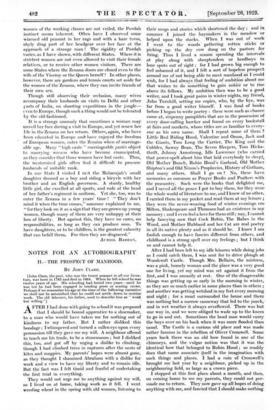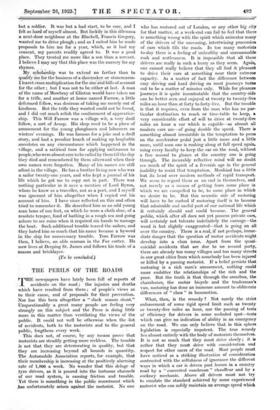. NOTES FOR AN AUTOBIOGRAPHY
[John Clare, the poet, who was the truest peasant in all our litera- ture, was born in 1793 and died in 1864. When he left school he was twelve years of age. His schooling had lasted two years—until he- was ten he had been engaged in tending geese or scaring crows. Perhaps if we remember his age at the time of the following narrative we shall not be, astonished that he could not settle down to routine work. The old labourer, his father, used to describe him as " weak but willing."] •
AFTER I had done with going to school it was proposed that I should be bound apprentice to a shoemaker,. to a man who would have taken me for nothing out of kindness to my father. But I rather disliked this bondage ; I whimpered and turned a sullen eye upon every persuasion till they gave me my will. A neighbour offered to teach me his trade, to be a stonemason ; but I disliked this, too, and got off by urging a dislike to climbing, though I had climbed trees in raptures after the nests of kites and magpies. My parents' hopes were almost gone, as they thought I shammed Abraham with a dislike for work and a view to have my liberty and to remain idle. But the fact was I felt timid and fearful of undertaking the first trial in everything.
They would not urge me to anything against my will, so I lived on at home, taking work as it fell. I went weeding wheat in-the spring with old women; listening to their songs and stories which shortened the day ; and in summer I joined the hayrriakers in the meadow or helped upon the stacks. When I was out of work I went to the woods gathering rotten sticks or picking up the dry cow dung on the pasture for firing. Thus I lived a season spending the intervals at play along with sheeptenders or herdboys in lone spots out of sight ; for I had grown big enough to feel ashamed of it, and I felt a sort of hopeless prospect around me of not being able to meet manhood aS I 'could Wish, for I had always that feeling of ambition' about me that wishes to a o'..omeitiing to gain nOtiee' or to rise above its fellows. My ambition then was to be a good writer, and I took great pains in winter nights, my friend, John Turnhill, setting me copies, who, by the bye, was far from a good writer himself. I was fond of books before I began to write poetry : these were such as chance came at, sixpenny paniphlets that are in the possession of every door-calling hawker and found on every bookstall at fairs and markets, whose titles are as familiar to every- one as his own name. Shall I repeat some of them ? Little Red Riding Hood, Valentine and Orson, Jack and the Giants, Tom Long the Carrier, The King and the Cobbler, Sawny Bean, The Seven Sleepers, Tom Hicka- thrift,' Johnny Armstrong, Idle Lawrence (who carried that power-spell about him that laid everybody to sleep), Old Mother Bunch, Robin Hood's Garland, Old Mother Shipton's and Old Nixon's Prophecies, History of Gotham, and many. others. Shall I go on ? No, these have memories as common as Prayer Books and Psalters with the peasantry. Such were the books that delighted me, and I saved all the pence I got to buy them, for they were - the whole world of literature to me, and I knew of no other. I carried them in my pocket and read them at my leisure ; they were the never-wearing food of winter evenings. ere Milton, Shakespeare and Thomson had an existence in my memory ; and I even feel a love for them still ; nay, I Cannot help fancying now that Cock Robin, The Babes iii the Wood, and Mother Hubbard and her Cat are real poetry in all its native plenty and as it should be. I knOw. I am foolish enough to have fancies different from others, and childhood is a strong spell over my feelings ; but I think so and cannot help it.
After I had been left to my idle leisures while doing jobs as I could catch them, I was sent for to drive plough at Wooderoft Castle. Though Mrs. Bellairs, the mistress, was a pink, homely woman and the place was a very good one for living, yet my. mind was set against it from the first, and I was uneasily at rest. One of the disagreeable things was getting up so early in the morning in winter, as they are so much earlier in some places than in others ; and another was getting wetshod in my feet every.morning: and night ; for a moat surrounded the • house and there was nothing but a narrow causeway that led to the porch,' and in wet weather it always overflowed. There was but one way in, and we were obliged to wade up to the knees to go in and out. Sometimes the head man would carry the boys over on his back when it was more flooded than usual. The Castle is a curious old place and was made rather famouS in the rebellion of Oliver Cromwell. Some years back there was an old bow found in one of the chimneys, and the vulgar notion was that it was the identical bow that belonged to Robin Hood ; so readily does that name associate itself in the imagination with such things and places. I had a coin of Cromwell's brought me last year by a neighbour, picked up in the neighbouring field, as large as a crown piece.
I stopped at this first place about a month, and then, on coming home to see my parents, they could not per- suade me to return. They now gave up all hopes of doing anything with me, and fancied that I should make nothing but a soldier. It was but a bad start, to be sure, and I felt as hard of myself almost. But lUckily in this dilemma a next-door neighbour at the Bluebell, Francis Gregory, wanted me to, drive plough ; and as I suited him he made proposals to hire me for a year, which, as it had my consent, my parents readily agreed to. It was a good place. They treated me_ more like a son than a servant. I believe I may say that this place was the nursery for my rhymes. • My, s,cholarship was to extend no farther than to qualify me for the business of a ShOemaker, or stonemason. learnt cross multiplication for the One"and bills of account for the other ; but I was not to be, either at last. A man of the name of Mowbray of Glinton would have taken me for a trifle, and another at home named Farrow, a little deformed fellow, was desirous of taking me merely out of kindness. But the trifle they wanted could not be found, and I did not much relish the confinement of apprentice- ship. This Will Farrow was a village wit, a very droll `fellow, a sort of Aesop. His shop used to be a place of amusement for the young ploughmen and labourers on winters' evenings. He was famous for a joke and a droll story, and had a peculiar knack of making up laughable . anecdotes on any circumstance which happened in the :village, and a satirical turn for applying nicknames to .people,who were almost sure to be called by them till the day they died and remembered by them afterward when their own names were forgotten. Many of his names arc still afloat in the village. He has a brother living now who was a sailor twenty-one years, and who kept a journal of his life which he got me to copy out in part. There was nothing particular in it save a mention of Lord Byron, whom he knew as a traveller, not as a poet, and I myself was ignorant of him altogether. when I copied out his account of him. I have since reflected on this and often tried to remember it. He described him as an odd young man lame of one foot, on which he wore a cloth shoe, of a resolute temper, fond of bathing in a rough sea and going ashore to see ruins when it required six hands to manage the boat. Such additional trouble teazed the sailors, and :they hated him so much that his name became a byword in the ship for unnecessary trouble. Tom Farrow was then, I believe, an able seaman in the Fox cutter. He now lives at Deeping St. James and follows his trade of a mason and bricklayer.
(To be concluded.)



















































 Previous page
Previous page